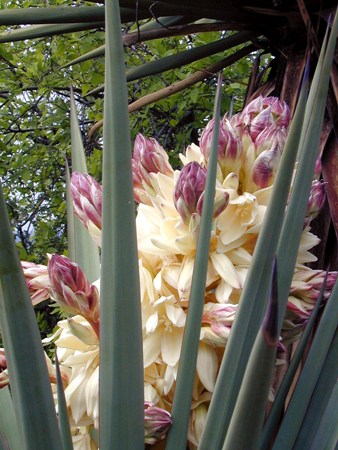
Yucca extract is a natural surfactant or wetting agent. Yucca schidigera contains saponins, a soapy, steroidal-like substance that acts as a natural spreader/sticker for horticultural use. It only takes a little yucca extract to be effective. As little as 1/16th teaspoon will treat over 5 gallons of water. Yucca helps water and nutrients penetrate deeper into the root zone, and yucca’s natural cleaning action helps keep drip emitter lines from clogging.
Surfactants like yucca extracts are great to add to foliar sprays. Water is a polar molecule; it holds a small positive charge on one side of the water molecule and a negative charge on the other. That’s why water beads up on a waxy surface. But the natural saponins in yucca extracts depolarize the water molecule, allowing foliar sprays to spread out more evenly on the waxy leaf surface. The thin film that is created covers a greater surface area on the leaf for better and more even absorption by the plant cells.
Yucca in and of itself is also good for plants, helping with water and nutrient absorption and acting as a plant protection agent. For example, yucca extracts are taking the place of copper sulfate in much of Europe to help prevent and treat fungal diseases such as apple scab. Yucca offers a natural alternative to petroleum-based surfactants and chemical sprays, and it’s completely safe for the environment.
Yucca is great for flushing excess salts from plant roots. Nutrient salts tend to build up in the growing medium due to repeated wetting and drying of the fertilizer mixture. Over time, the salt build up makes it harder and harder for the plant to take up water and the plant begins to suffer from salt stress. Yucca makes water “wetter”. Its surfactant action allows the water to penetrate deeper into the soil and flush away more of the accumulated salts from the root zone. As a result, plants are able to use water more efficiently and recover more quickly from the symptoms of drought stress.
Organic yucca extracts are also a valuable addition to compost teas and other microbial inoculants. Since yucca contains complex sugars, it is a stable carbon source for plant-growth-promoting microorganisms in the root zone. Microorganisms convey many benefits to plants, including the mineralization of organic matter, improved root growth and induced resistance to pests and disease. So over time and with continuous use, yucca will help stabilize soil pH, decrease soil compaction, and increase the availability of essential trace elements to the roots.
Yucca extracts are sometimes added to concentrated nutrient formulas, especially when mixing mineral salts with organics. Yucca helps keep minerals and organics in suspension with each other in concentrated form. Sometimes the higher molecular weight organic molecules tend to settle out of solution. But if the solution contains yucca, a quick shake will disperse everything back into suspension for the perfect blend. Yucca extracts foam when shaken or vigorously stirred, though, so yucca is usually added to the mixing tank last.
Harley Smith is a free-lance contributor to Garden & Greenhouse Magazine. Information for this article was provided by NPK Industries, you can visit their website at NPK-Industries.com.
Related Articles & Free Email Newsletter
A Secret Bed Building and Potting Soil Recipe
Proper Mulching is One of the Best Things You Can do for Your Plants




Comment here